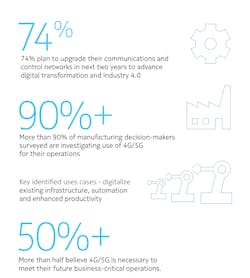Survey Says: Private Cellular Networks Show Promise
As most progressive manufacturers realize, the digitalization movement is more of a journey than a destination. And, while goals may include mass customization and the ability to effectively operate in a “lights out” capacity when needed, most manufacturers pursuing Industry 4.0 realistically operate as what’s better defined as a modern factory growing levels of connectivity demonstrating the benefits of mobility, flexibility and agility.
As organizations embrace opportunities to increase connectivity and ultimately blur the lines between IT/OT environments, the role wireless investments can play is becoming crystal clear. Fortunately, manufacturing decision makers understand the value. According a recent survey conducted by Nokia and ABI Research, 74% of respondents are looking to upgrade their communications and control networks by the end of 2022 with more than 90% investigating the use of either 4G and/or 5G in their operations. Just over half of respondents (52%) believe that the latest generation of 4G/LTE and 5G will be necessary to meet their transformational goals. Specifically, respondents note the need to digitalize and improve existing infrastructure (63%), automation with robotics (51%) and achieve new levels of employee productivity (42%).
“We have reached an inflection point in Industry 4.0 transformation as the fast, secure, low latency connectivity underpinning its implementation now becomes available,” explains Nokia Enterprise Vice President Marketing Manish Gulyani. “This research indicates the strong marketplace appetite for industrial-grade wireless networking to capture the transformational benefits of digitalization and automation. We believe that demand, combined with easy-to- deploy private wireless solutions, will drive adoption.”
“We are at a point where we need to look at the blending of IT/OT environments as an integration and collaboration rather than a convergence,” says ABI Research Principal Analyst Ryan Martin. “But the reason why it's been such a challenge is because different functions and different departments are motivated and measured by different KPIs.”As manufacturers seek to enable new levels of mobility and employ advanced robotics, the answer is dedicated or private cellular network, something where the survey shows a surprising level of awareness, explains Martin. “Importantly, research findings indicate a preference for deploying private fully-owned and operated wireless networks, with manufacturers favoring in-house management to allay security concerns. It’s evident that respondents are not entirely committed to Wi-Fi/WLAN and will consider latest generations of wireless technologies. As a result, 2020 is a critical year for networking suppliers to educate the market regarding the merits of 4G/LTE and 5G,” he says.
Martin tells IndustryWeek, “for manufacturers, the most important action point is to get started by finding the low hanging fruit in terms application enablement and dive in. The dedicated cellular network infrastructure will become a critical requirement moving forward, given the network density of future manufacturing factories.”
The idea of having a cellular network support manufacturing operations has long been a challenge because of spectrum availability, a spotty device ecosystem as well as a mishmash of other wireless technologies already enabling different levels of communication across parts of the facility (WiFi, WLAN, Bluetooth, public cellular), explains Dave Nowosiat, senior marketing manager, Nokia. “The situation is changing. First, the availability of spectrum is improving globally with governments allocating dedicated spectrum to enterprises rather than mobile operators or service providers,” Nowosiat says. “Secondly, the ecosystem is intensifying with thousands of LTE connected devices, sensors, connected machines, autonomous robots, guided vehicles leveraging cellular connections. As such, manufacturers can consolidate on a secure cellular network that provides great reliability and scalability needed for their digital transformation.”
About the Author
Peter Fretty
Technology Editor
As a highly experienced journalist, Peter Fretty regularly covers advances in manufacturing, information technology, and software. He has written thousands of feature articles, cover stories, and white papers for an assortment of trade journals, business publications, and consumer magazines.

